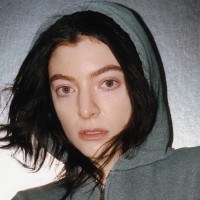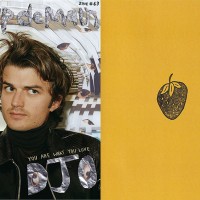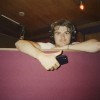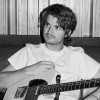Q&A: Andrew Garfield and Daisy Edgar-Jones tell you everything you need to know about 'Under The Banner Of Heaven'.
Q&A: Andrew Garfield and Daisy Edgar-Jones tell you everything you need to know about 'Under The Banner Of Heaven'.
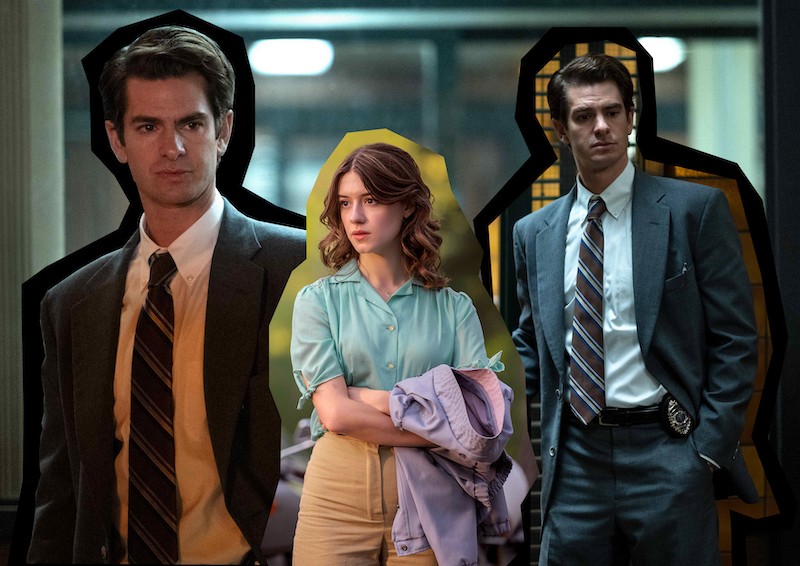
The new series 'Under The Banner Of Heaven' has just hit Disney+, following the story of a devout detective having his faith tested as he uncovers a gruesome murder connected to a respected Utah family's spiral into LDS fundamentalism. The show is inspired by a novel of the same name written by Jon Krakauer, and stars Andrew Garfield as Jeb Pyre the investigating detective, and Daisy Edgar-Jones as Brenda Wright Lafferty who was murdered with her baby in 1984.
Alongside the release of the show, Andrew Garfield and Daisy Edgar-Jones tell you everything you need to know about 'Under The Banner Of Heaven'...
What excites you the most about the international launch of the limited series, 'Under The Banner Of Heaven'?
ANDREW GARFIELD: I’m really excited for this story to be put into the world. I’ve loved this book ['Under The Banner Of Heaven: A Story Of Violent Faith' by Jon Krakauer] since it was first released 10 years ago, and Dustin Lance Black has adapted it so faithfully and beautifully. I think audiences can expect a compelling, thrilling story. It’s a true crime thriller that deals with deeper themes of life and death, and spirituality. It’s about how good men can convince themselves that they are doing terribly evil things in the name of God. I think it’s incredibly timely for our extremist and fundamentalist times. It feels like an unfortunately prescient story for this moment in time.
How much do you relate to your character in the show, Jeb Pyre?
ANDREW: Jeb is very different to me. I’ve not played a character like Jeb Pyre within my career, but that’s one of the reasons why I was excited and drawn to the part. What attracted me to the story and to Jeb particularly is his pursuit of truth at the risk of losing everything that he personally holds dear. That’s the journey he’s on. He’s forced to be a truth seeker to the detriment of his own relationships with his faith, his wife, and his kids. He’s put in a very, very impossible moral position. For me, I find it fascinating to consider what a human being will do in that situation. What is the path that one must follow? What is integrity? What is your moral obligation? What is the decent thing to do when you’re given a choice between losing everything you personally hold dear or doing something that’s right for the greater good? It’s a really interesting dilemma.
What research did you undertake in order to portray Detective Jeb Pyre?
ANDREW: All the work was already in the script. Dustin Lance Black had created a fully formed script that was full of research. It was a script full of knowledge and information about LDS history and Mormon history, as well as practices and culture. On top of that, I got the opportunity to do a research trip to Salt Lake City and the neighbouring towns. Obviously, I reread Krakauer’s book – but I also read a lot of other texts, memoirs, and books about Mormon history. I also read about personal experiences within the Mormon community and I met with a lot of ex-Mormons, current Mormons, and Mormons who are currently going through a crisis of faith. I met with bishops in the Mormon community and I tried to fully immerse myself. I went to church meetings and gatherings in Utah, where I was welcomed and allowed to observe. It was a truly fascinating dive. That’s one of the parts of the process I love the most. As an actor, I feel like research enhances your ability to trust that you can believably live the life of whatever character it is you’re playing.
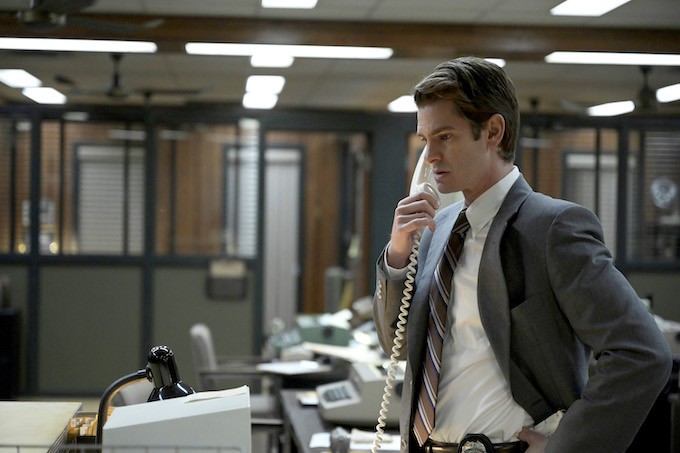
Did the local community recognise you during your research trip to Utah, or could you wander around the area with a sense of anonymity?
ANDREW: It varied. Oftentimes, I would remain anonymous. But just as often, no. In the Mormon community, there’s less agitation around celebrity, so that was cool. They were interested in films and filmmaking, as well as the craft behind the camera. But in terms of celebrity, I think they are not culturally encouraged to value false idols in the way that we are maybe more inclined to do as a culture. That’s one thing about a spiritual life that I really admire. I love that there’s a resistance to false idolatry. I think that’s really healthy.
In the first episode, Jeb Pyre displays some impressive lasso skills when he plays with his children. How long did it take you to master this particular talent for the role?
ANDREW: The lasso work was terrifying. There’s always at least one aspect of a project where you go, “Well, how am I going to conceivably and convincingly do this?” For 'Under The Banner Of Heaven', lassoing was that thing. I wasn’t concerned about the detective work or the Mormon side of the character, but I was concerned about the lassoing. Especially because there were two amazing young girls playing my daughters and I was terrified of injuring them – but they were so game and so up for it. I practiced on a fake sheep, and then the team said, “Okay, now you’re going to be lassoing these two human girls, who are your daughters in the story. And we’re going to be filming it, but we’re running out of light. We need to get this done pretty quickly, so you’d better have done your homework.” That was the most stressful day of the shoot, which is saying something because we’re dealing with incredibly dark themes in this show.
There are a number of traumatic and bloody moments in the first episode. Can you take us on set for the shooting of these scenes in particular. How true-to-life did it look and feel?
ANDREW: They were definitely not fun days, but they were important days on set. Obviously, these scenes are the core and the heart of the story as they are the catalyst of our story. We wanted to make it as authentic and real as possible, so we didn’t rehearse these scenes. I said to our director, David [Mackenzie], “Just dress the set. Get it ready to go. Light it as you wish and let me discover it, if you don’t mind.” On the first or second take, you’ll usually find an actor will do something that they won’t do in the following takes. There will be something surprising and spontaneous that will most likely happen in those first takes, so you’re going to want to capture that. That’s the way David likes to work anyway. He’s very Ken Loach in that respect. He wants to capture life and he wants it to feel very alive. In that respect, our way of working connected in a very good way.
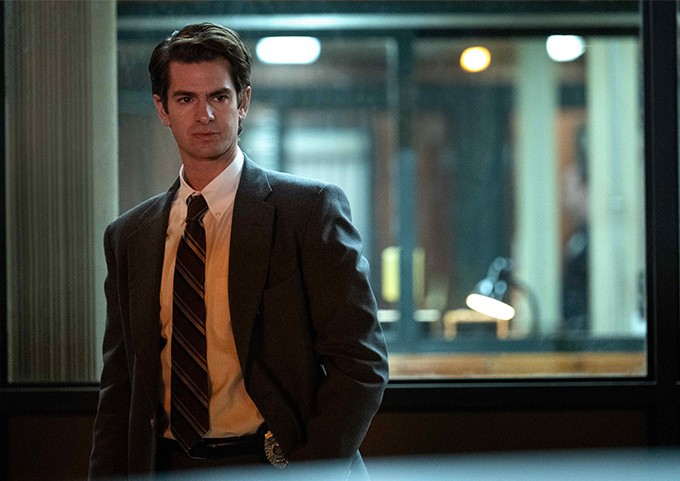
As an actor, how do you tackle the darker scenes in a show like this?
ANDREW: You definitely hope that you get something good in the first two takes so that you don’t have to keep doing it because it’s not pleasant. Plus, it’s hard to recreate the unpleasantness over and over and over again. However, you then think, ‘Well, we’re here to honour the memory of these two people. We’re here to honour the memory of Erica Wright Lafferty and Brenda Wright Lafferty.’ That’s the thing that pulls you through. You keep remembering that that’s our North Star and these two people were taken in this horrific way, but it’s our duty and our responsibility to honour their memory through this story.
How much of a challenge is it for you to switch off after working on emotional scenes in a drama like 'Under The Banner Of Heaven'?
ANDREW: Personally, I feel very lucky and privileged that I get to go home and watch a basketball game or cook a meal for myself and talk to a friend. Even though we’re play acting, the body doesn’t know it’s not real when you’re putting yourself in a situation like this. As an actor, you’re convincing yourself of the reality of this non-reality. However, it’s humbling when you have the ability to go back to a nice comfy bed and you have the knowledge that your loved ones are all safe. That’s one of the reasons why I love doing this job; the fact that you get to walk a mile in someone else’s shoes and you get to think, ‘There but for the grace of God go I.’ You feel very lucky by comparison. There’s a humbling perspective shift that you get to experience, depending on what project you’re working on. Of course, with this project and with these characters going through such hell – and specifically my character, Jeb, having to deal with everything he is dealing with – it’s humbling that I get to take off that hat at the end of my working day. I get to go, “That’s not my reality, but I just had a taste of what the reality could be.” If you let it, it affects how you move through your life and it affects how you see the world in a way that is fully rounded and appreciative of your privilege and good fortune. It’s humbling.
What excites you the most about the international launch of 'Under The Banner Of Heaven'?
DAISY EDGAR-JONES: The show is inspired by a book by Jon Krakauer, and it’s a brilliant book. It’s such a rich source material to pull from. I found it very gripping when I read it. ['Under The Banner Of Heaven' creator, show-runner and executive producer] Dustin Lance Black has done a very good job of taking this particular case and exploring it within these episodes. I think it’s classily done and the tension is built really well. True crime is a very popular genre, so I think it will really resonate with a large international audience.
Why are audiences fascinated with true crime stories like this? Are you a fan of the genre?
DAISY: I am a fan. Absolutely. I think we’re all inherently curious and I think the mystery aspect of true crime is something that really grips viewers. It certainly grips me. The mystery aspect of true crime is what I find really compelling when I watch the genre and read these stories.
How would you describe your character in the show, Brenda Wright Lafferty?
DAISY: Brenda Wright Lafferty is a young woman who grew up in the Mormon faith in Idaho. Brenda is a very warm, generous, kind, and confident person. She comes to Utah to pursue broadcast journalism at BYU [Brigham Young University in Provo, Utah]. That’s where Brenda meets Allen Lafferty, who she ends up marrying. Allen introduces her to the wider Lafferty family.
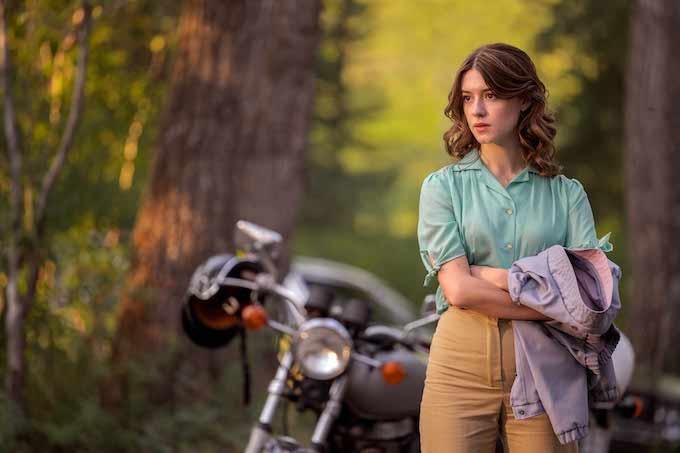
Brenda was a very modern woman for 1984. Did you find that inspiring?
DAISY: Yes, Brenda and her family were very liberal. Her family encouraged her to get an education and her sisters were really encouraged to have agency. For me, I think it’s very cool to see the range of female experience in the show from Brenda to Matilda [Lafferty, played by Chloe Pirrie] and Dianna [Lafferty, played by Denise Gough]. There’s a real spectrum of experience. I think it’s really cool to see the other women through Brenda’s eyes and the difference in the way they experienced the faith, but also that family dynamic.
How do you prepare for a role when it’s based on a real person? Does your process change in comparison to fictional roles?
DAISY: For Brenda, I definitely wanted to approach the role with a lot of sensitivity. I wanted to be diligent about making sure that I was being very sensitive to how I was portraying her. The character that Lance rendered on the page was very clear to me, so as soon as we started to get into filming, it was about working out how to bring this characterisation to life. I really wanted to celebrate her kindness, which is something that shone through the page to me.
During your research for the role, you were given letters written by Brenda Wright Lafferty to her sister. How did this help your preparation process?
DAISY: It was very, very helpful to have access to those letters in order to get a real sense of the person. On this job, we had a vast amount of research that was available to us. We had lots of people there to help guide us when it comes to the Mormon community and learning about it. Lance was a brilliant sounding board, too. It was always helpful to have as much research available to be able to use.
Were you able to talk to Brenda’s sister during your research for the role?
DAISY: Just before we started, I rang Brenda’s younger sister, Sharon, because I wanted to touch base and say hello. I can imagine it would be incredibly odd for her, so I wanted to make sure that I was sensitive to that. I thought it was important to check in before I started the work.
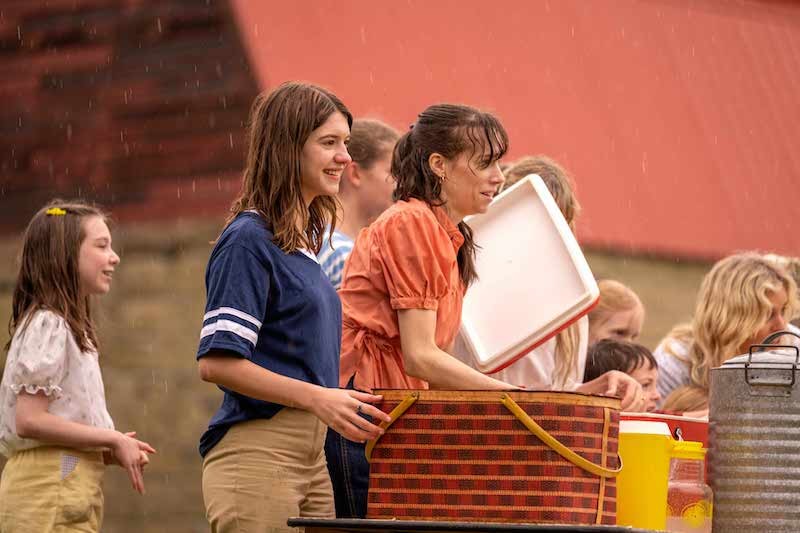
Religion can be a tricky subject to undertake, especially when murder is involved in the story. What do you think of the way the LDS Church and Mormonism is presented in the show?
DAISY: When I first started to think about taking on this project, I knew that [executive producer] Ron Howard was involved with the show, as well as Dustin Lance Black. I have always been impressed with their work, so I knew we were in safe hands in terms of the handling of this material. I knew it was going to be thoroughly researched and they were going to be very sensitive to all aspects of the story. I had a lot of competence in the team behind the show.
How much have you learned from being on a drama like this?
DAISY: I’ve learned a huge amount. One of my favourite parts of being an actor involves delving into an aspect of knowledge that you didn’t have before. I learned so much from reading the book, from exploring the character and from being in the series – and I think that’s something that audiences will do, too. I think it’s always interesting to be exposed to a different community; something that you may not know about yourself.
What surprised you the most about your research into the LDS Church?
DAISY: I didn’t know much about this subject area at all before I started the project, so pretty much everything I learned was new to me. Everything was a surprise. Reading the book that the show is inspired by has been fascinating, but I learned a huge amount about the faith in general because I had no prior knowledge.
Can you talk about your experience of working with Dustin Lance Black?
DAISY: Lance was very present. I mean, he adapted the book and he directed one of the episodes, but he was always very present every day on set. He grew up within this community, so it was really helpful to have him around. He was a very good source of knowledge for us to use as well.
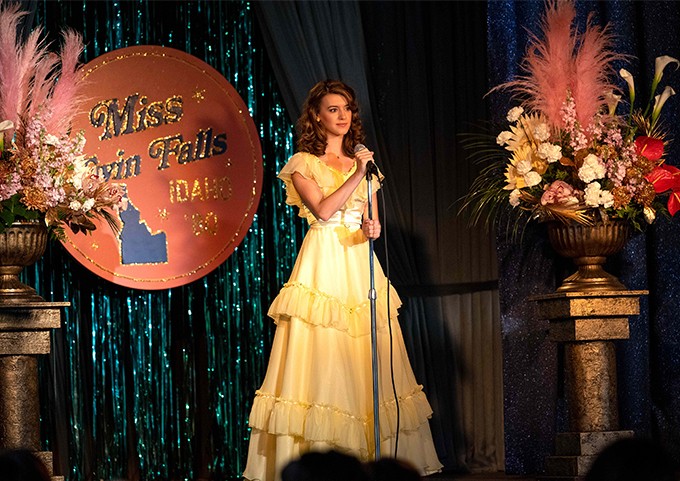
How would you describe the atmosphere on set during the shoot?
DAISY: From episode to episode, the scenes in the show are very different. In earlier episodes, Brenda is incredibly joyful and there’s a real warmth to her initial interactions – but then it descends into something very different. In that sense, I think the atmosphere would depend on the scene of the day. In the latter half of filming, everyone was a lot more somber when it came to certain scenes.
'Under The Banner Of Heaven' is a serious crime drama, but there are some lighter moments in the story. For example, we see Brenda singing for a pageant in an early episode. How did it feel to sing on screen?
DAISY: Singing? <laughs> I mean, not to any great skill! That was my first day of filming, so it was quite surreal. I, myself, would be too terrified to sing in front of a group of people. Particularly in a pageant contest, so it was a really good realisation of how acting allows you to do something that you yourself would never do. The costume was really fun that day, that big yellow outfit. I think I’m going to leave singing 'The Rose' to Bette Midler, because she’s much more able to sing it than me.
Does this mean it was a very nerve wracking first day on set for you?
DAISY: Yes, I was singing in front of a huge room of people. Plus, it’s a hard song to sing. Luckily, I felt safe in the fact that Brenda becomes runner-up. Had she won the contest, I would have felt even more nervous because I would’ve had to be really good – but she came runner-up, so I purposely made it a little bit off-key.
Were you able to visit Utah as part of your research process?
DAISY: Unfortunately, no. I was filming in New Orleans before the project started. And because of COVID, I didn’t have a chance to visit Utah. Instead, I went straight to Calgary to start filming – but I know Andrew [Garfield] visited the area and he was a really brilliant sounding board for us, too. He has a great depth of knowledge when it comes to the subject matter because he’d visited the area. But I’d love to go and visit in the future.
'Under The Banner Of Heaven' is streaming on Disney+ now.













